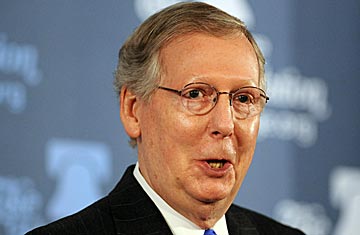
Senator Mitch McConnell speaks at the Heritage Foundation on Nov. 4
On Nov. 4, just two days after the Republicans' midterm sweep, the Senate minority leader, Mitch McConnell, gave what was perhaps the highest-profile speech of his career. But because the Kentuckian's charisma quotient is decidedly low — he makes Harry Reid look like James Brown — the event at the Heritage Foundation got hardly any media coverage.
Titled "Listening to the Voters, Finishing the Job," McConnell's talk and Q&A served as a perfect illustration of the Republican Party's laser-like focus on the economy at the exclusion of pretty much everything else. In his prepared remarks, the Senator made only the most fleeting reference to any matter beyond Obama's spending agenda. For the past four decades, Republicans have sought to dominate many national debates by highlighting their strengths on financial policy, national security and social issues. This cycle, however, the GOP replaced that weighty three-legged stool with a supercharged economic pogo stick and bounced its way to a midterm wipeout.
Throughout 2010 in the run-up to Election Day, Republicans across the country showed extraordinary discipline in focusing on a compact basket of economic issues including debt, spending, taxes, Obama's health care law and the size and scope of domestic spending. As a political strategy, this made great sense. With joblessness high, business investment and consumer confidence low and dissatisfaction with President Obama growing, Republicans were able to home in on a single theme in campaign commercials, on the stump and during debates. It kept Republicans united, targeted voters' greatest concern as well as the Administration's greatest weakness and allowed the GOP to triumph without having to be specific about what policies they would pursue once in power.
But remarkably, with the election over and won, Republicans have done nothing to broaden their agenda. What was most notable about McConnell's appearance at Heritage was his response to an audience query as to whether he had any unease about the Administration's policy toward China. The Senate's top Republican replied, "I don't really have any observation about that." China's increasing power might be a remote concern for most Americans right now, but it is a conspicuously dominant factor in the United States' economic, diplomatic and military future. McConnell's blithe brush-off was shocking and almost comical.
So it goes with a whole range of issues that until recently have been a big part of our national debates. China, Russia, Afghanistan, Iraq, Iran, abortion, gay rights, affirmative action, judges, stem-cell research, education vouchers — the list runs on and on. McConnell is no less publicly opinionated about these topics than most other leading members of his party.
In some ways, the Republican failure to espouse alternative policies on these matters is understandable and even practical. As long as unemployment hovers near double digits, housing remains a dragging sector and Washington's gridlock offers little relief, perhaps the federal government really should ignore everything except the immediate problem of turning the nation's economy around. Republican Governor Mitch Daniels of Indiana, a potential presidential candidate, has suggested that dealing with the debt is so important that the nation might need to declare a truce on social issues until America's finances are sorted out.
For perhaps a few more months, Obama will have mostly free rein to, for example, shape international policy and pick his judges while the economic fights rage in Washington, particularly on deficit reduction and job creation. Eventually, however, national security and social matters will reappear on the American agenda. With the Iowa caucuses a mere 14 months away, heralding the struggle for the Republicans' 2012 presidential nomination and campaign against Obama, we no doubt will see issues besides economics return to the fore. Mitch McConnell might even have something to say about China policy at that point.
One Nation, Halperin's politics column for TIME.com, appears every Monday.
